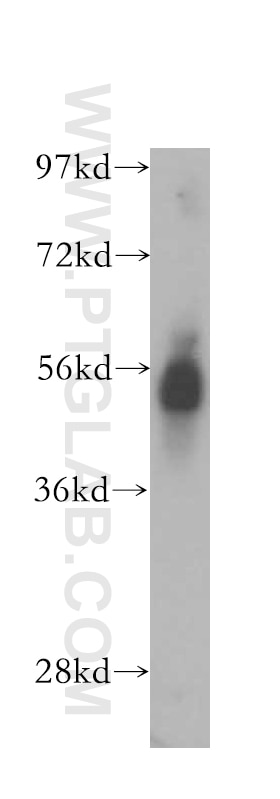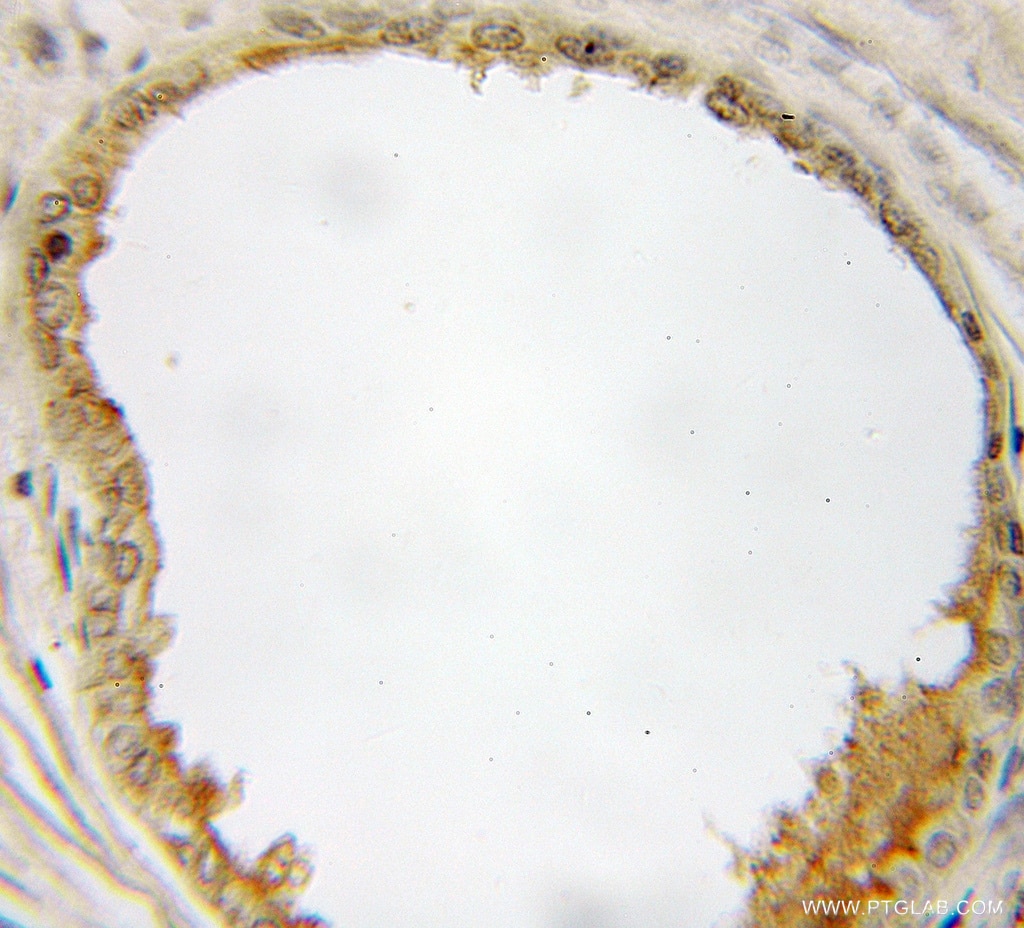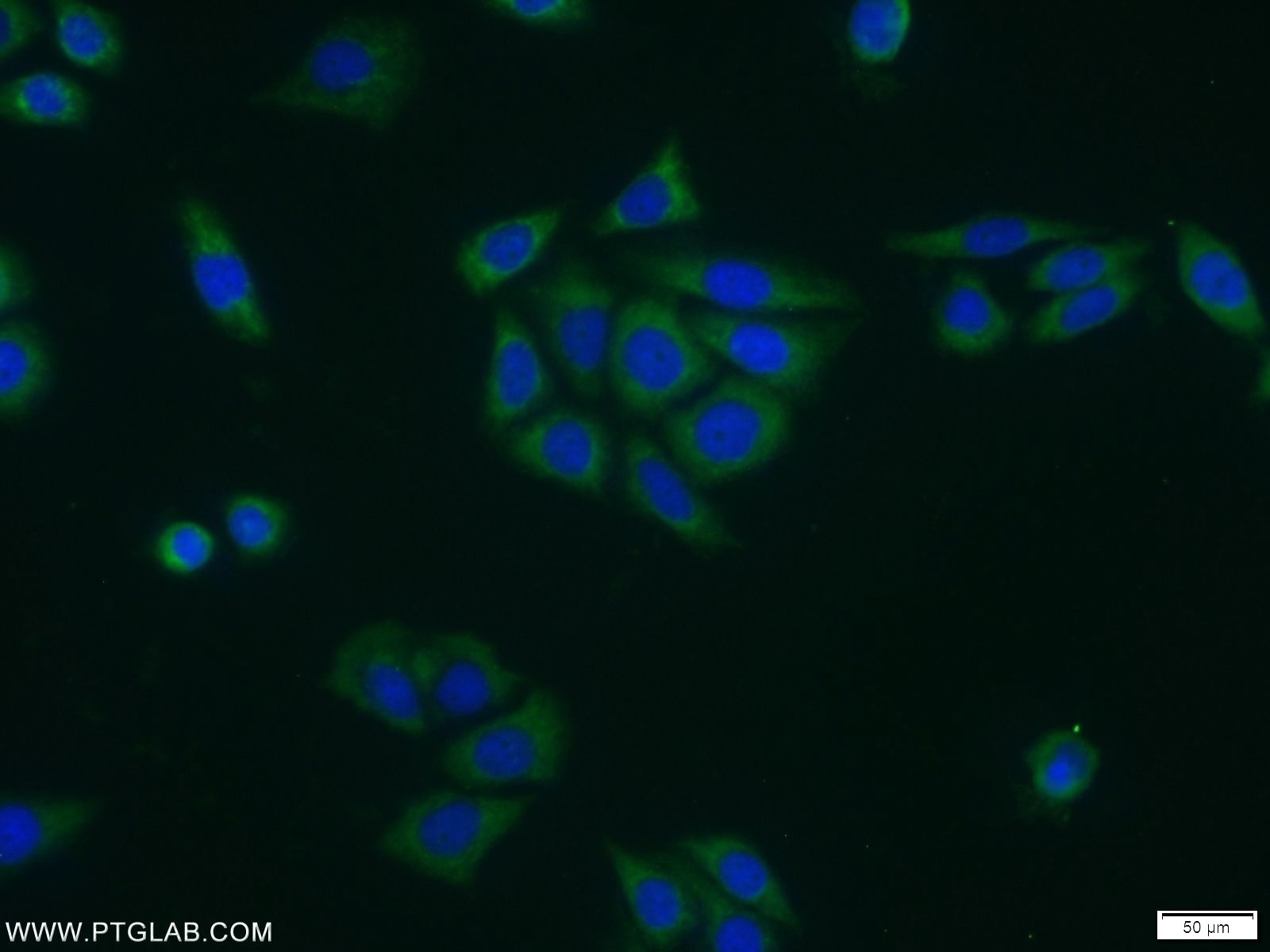- Phare
- Validé par KD/KO
Anticorps Polyclonal de lapin anti-DPP4/CD26
DPP4/CD26 Polyclonal Antibody for WB, IF, IHC, ELISA
Hôte / Isotype
Lapin / IgG
Réactivité testée
Humain, Hamster et plus (1)
Applications
WB, IF, IHC, ELISA
Conjugaison
Non conjugué
N° de cat : 10940-1-AP
Synonymes
Galerie de données de validation
Applications testées
| Résultats positifs en WB | cellules PC-3 |
| Résultats positifs en IHC | tissu de cancer de la prostate humain il est suggéré de démasquer l'antigène avec un tampon de TE buffer pH 9.0; (*) À défaut, 'le démasquage de l'antigène peut être 'effectué avec un tampon citrate pH 6,0. |
| Résultats positifs en IF/ICC | cellules PC-3 |
Dilution recommandée
| Application | Dilution |
|---|---|
| Western Blot (WB) | WB : 1:500-1:1000 |
| Immunohistochimie (IHC) | IHC : 1:20-1:200 |
| Immunofluorescence (IF)/ICC | IF/ICC : 1:10-1:100 |
| It is recommended that this reagent should be titrated in each testing system to obtain optimal results. | |
| Sample-dependent, check data in validation data gallery | |
Applications publiées
| KD/KO | See 1 publications below |
| WB | See 7 publications below |
| IHC | See 2 publications below |
| IF | See 4 publications below |
Informations sur le produit
10940-1-AP cible DPP4/CD26 dans les applications de WB, IF, IHC, ELISA et montre une réactivité avec des échantillons Humain, Hamster
| Réactivité | Humain, Hamster |
| Réactivité citée | rat, Humain |
| Hôte / Isotype | Lapin / IgG |
| Clonalité | Polyclonal |
| Type | Anticorps |
| Immunogène | DPP4/CD26 Protéine recombinante Ag1380 |
| Nom complet | dipeptidyl-peptidase 4 |
| Masse moléculaire calculée | 88 kDa |
| Poids moléculaire observé | 55-60 kDa |
| Numéro d’acquisition GenBank | BC013329 |
| Symbole du gène | DPP4 |
| Identification du gène (NCBI) | 1803 |
| Conjugaison | Non conjugué |
| Forme | Liquide |
| Méthode de purification | Purification par affinité contre l'antigène |
| Tampon de stockage | PBS avec azoture de sodium à 0,02 % et glycérol à 50 % pH 7,3 |
| Conditions de stockage | Stocker à -20°C. Stable pendant un an après l'expédition. L'aliquotage n'est pas nécessaire pour le stockage à -20oC Les 20ul contiennent 0,1% de BSA. |
Informations générales
DPP4 (also known as CD26) is a serine exopeptidase that cleaves X-proline dipeptides from the N terminus of polypeptides. It is an intrinsic membrane glycoprotein anchored into the cell membrane by its N-terminal end. High levels of the enzyme are found in the brush-border membranes of the kidney proximal tubule and of the small intestine, but several other tissues also express the enzyme. The enzyme is present in the fetal colon but disappears at birth. It is ectopically expressed in some human colon adenocarcinomas and human colon cancer cell lines(PMID:1977364).The dimeric 150- 220 kDa DPPIV has been reported to be active and accessible to DFP labeling, but the 110 kDa monomeric DPPIV is not(PMID:9065413). Sometimes traces of the 290 kDa active dimeric form of DPP IV as well as a 55-60 kDa protein appeared in the immunopurified DPP IV preparation. N-terminal amino acid sequence analysis revealed that the 55-60 kDa protein represents a fragment of DPP IV starting at amino acid 28.(PMID:9654125).
Protocole
| Product Specific Protocols | |
|---|---|
| WB protocol for DPP4/CD26 antibody 10940-1-AP | Download protocol |
| IHC protocol for DPP4/CD26 antibody 10940-1-AP | Download protocol |
| IF protocol for DPP4/CD26 antibody 10940-1-AP | Download protocol |
| Standard Protocols | |
|---|---|
| Click here to view our Standard Protocols |
Publications
| Species | Application | Title |
|---|---|---|
Oncogene ApoC1 promotes the metastasis of clear cell renal cell carcinoma via activation of STAT3. | ||
Hypertension Dipeptidyl peptidase IV regulates proliferation of preglomerular vascular smooth muscle and mesangial cells. | ||
Int J Mol Sci Preclinical Repurposing of Sitagliptin as a Drug Candidate for Colorectal Cancer by Targeting CD24/CTNNB1/SOX4-Centered Signaling Hub | ||
Biochem Pharmacol Dipeptidyl peptidase-4 inhibition improves endothelial senescence by activating AMPK/SIRT1/Nrf2 signaling pathway.
| ||
Endocrinology Dipeptidylpeptidase inhibition is associated with improvement in blood pressure and diastolic function in insulin-resistant male Zucker obese rats. | ||
J Agric Food Chem A Low ω-6/ω-3 Ratio High-Fat Diet Improves Rat Metabolism via Purine and Tryptophan Metabolism in the Intestinal Tract, While Reversed by Inulin. |




